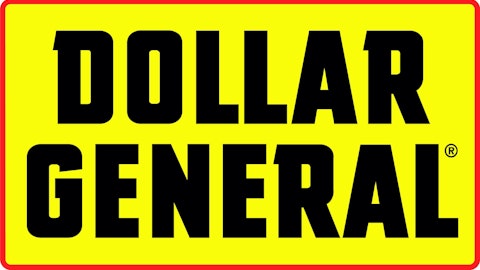Over the last few years, the Dollar Store segment has shown a remarkable outperformance. Dollar General Corp. (NYSE:DG), in particular, has become an increasingly attractive investment opportunity. In a previous article, we analyzed the risks that any potential stockholder should take into account when considering to participate in this business. In this occasion, we will look into the main reasons to believe that this company is worth our trust.
1) The growth potential of the Dollar stores concept
Although many seem to be concerned about the US economy, the fact is that, at least for Dollar Stores, the outlook is not bad at all. Even though some could argue that this business relies on a bad economy, where customers turn to Dollar Stores looking for value, the growth of disposable personal income over the last couple of years has largely benefited the segment. The key to their success could be in the fact that we are dealing with a differentiated concept, with considerable structural advantages, and plenty of growth opportunities which, by the way, have not yet reached their ceiling.


The opposite situation is the one that other players, such as supermarkets, discounters (i.e. Walmart or Costco) and drugstores (i.e. Walgreen, CVS or Rite Aid) have had to face. Undifferentiated and structurally disadvantaged, these segments have been unsuccessful in responding to the changes in consumer behavior, attributed primarily to economic cycles. These conduct modifications seem to have come to stay around for a while and, for the above mentioned reasons, the main beneficiaries of this conjunction appear to be Dollar Stores.


3) The possibility to increase the number of shops
The chance to open new stores in both preexisting and new markets has been studied and set in motion by Dollar General with compelling results (see Graph 3). Since 2007, the store base expansion has rounded an annual 7%. According to the latest Management´s Earnings Call, around 50% of 2013’s capital expenditure will be allocated for store growth and development, which means that approximately $300 million will be invested in new shops, remodels, relocations and the acquisition of preexisting store locations. Seems important to remark that, due to low cost building and operating, a new shop only costs $170,000, permitting a considerable yearly increase in the number of subsidiaries. Analysts (i.e. Credit Suisse) feel confident about the remaining growth potential and, although they predict some slowing down in the development rate, they estimate that over 15,000 Dollar Stores can still be introduced successfully in the US market.

The previously mentioned low costs allow that investment in new shops is rapidly balanced. As Richard W. Dreiling, Chairman and Chief Executive Officer at Dollar General, assures: “Our new traditional stores have a capital requirement of only $170,000. With a very fast sales ramp-up, our new stores are typically cash flow-positive in year 1 and have an average cash payback in under 2 years. This model provides us with continued great store economics. Despite our remarkable store growth over the past 4 years, we believe there still remains substantial opportunity for store growth in new and existing states.”
My foolish view
In conclusion, a combination of sectoral and company growth potential, along with an outstanding performance and a best-in-class execution, makes Dollar General an investment opportunity that remains quite appealing.
The article 3 Key Reasons to Invest In Dollar General originally appeared on Fool.com and is written by Victor Selva.
Copyright © 1995 – 2013 The Motley Fool, LLC. All rights reserved. The Motley Fool has a disclosure policy.



